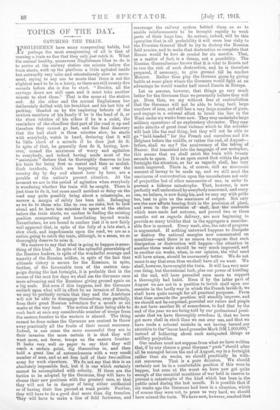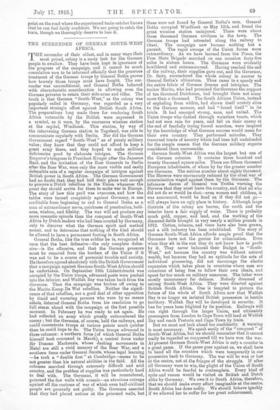TOPICS OF TIM DAY
• CATCHING THE TRAIN.
ENGLISHMEN have many exasperating habits, but perhaps the most exasperating of all is that of running a train so fine that they only just catch it. What the normal healthy, unnervous Englishman likes to do is to arrive at the railway station one minute before the train starts, walk up the platform a little agitated inside but outwardly very calm and ostentatiously slow in move- ment, saying to any one ho meets that there is not the slightest need to be in a hurry, as there are still twenty-five seconds before she is due to start. " Besides, all the carriage doors are still open and it must take another minute to shut them." That is the scene at the station end. At the other end the normal Englishman has deliberately dallied with his breakfast and his last bits of packing. Goaded on by the imploring behests of the anxious members of his family if he is the head of it, or the stern rebukes of his elders if he is a cadet, the reminders of the chauffeur that part of the road is up and therefore they cannot go fast, and the final discovery that the hall clock is three minutes slow, he starts with everybody, watch in hand, declaring that it will be little short of a miracle if he does just do it. In spite of that, he generally does do it, having, how- ever, caused the maximum of worry and agitation to everybody, and indeed having made most of the "assistants" declare that he thoroughly deserves to lose his train for being first so casual and then so mulish. Such incidents, which are happening all over the country day by day and almost hour by hour, are a parable of the nation's present situation. At the moment we are in the period of agitation when everybody is wondering whether the train will be caught. There is just time to do it, but some small accident or delay on the road may quite possibly bring about a catastrophe, so narrow a margin of safety has been left. Belonging as we do to those who like to run no risks, but to look ahead and to have ten minutes to spare at the station before the train starts, we confess to finding the existing position exasperating and humiliating beyond words. Nevertheless, we are bound to confess that it is now fairly well apparent that, in spite of the folly of a late start, a slow clock, and impediments upon the road, we are as a nation going to catch the train, although, in a sense, we so thoroughly deserve to miss it.
We venture to say that what is going to happen is some- thing of this kind. In spite of the splendid generalship of the Russian leaders, in spite of the wonderful courage and tenacity of the Russian soldier, in spite of the fact that ultimate victory is secure for the Russians, in spite, further, of the favourable turn of the eastern cam- paign during the last fortnight, it is probable that in the course of the next few days we shall see the Germans once more advancing and the Russians giving ground again on a big scale. But even if this happens, and the Germans embark upon what will in effect be an invasion of Russia, we may be perfectly certain that they and the Austrians will not be able to disengage themselves, even partially, from their great Russian adventure for a month or six weeks at the very least. The notion of their being able to rush back at once any considerable number of troops from the eastern frontier to the western is absurd. The thing cannot be done unless the Germans are content to throw away practically all the fruits of their recent successes. Indeed, in one sense the more successful they are in their invasion the more certain it is that they will want more, not fewer, troops on the eastern frontier. It looks very well on paper to say that they will reach a certain point, dig themselves in, and then hold a great line of entrenchments with a very small number of men, and so set free half of their two-million army for work elsewhere. We do not say that this is an absolutely impossible feat, but it is one which certainly cannot be accomplished with celerity, If these are the tactics to be adopted by the Germans, they will have to choose their new positions with the greatest care, so that they will not be in danger of being either outflanked or of having their line pierced at weak points. Further, they will have to do a good deal more than dig trenches. They will have to make a line of field fortresses, and rearrange the rail way system behind them so as to enable reinforcements to be brought rapidly to weak parts of their huge line. So serious, indeed, will be this operation that in all probability it will seem less risky to the Prussian General Staff to try to destroy the Russian field armies, and to make that destruction so complete that Russia would be hors de combat for six months. That, as a matter of fact, is a dream, not a possibility. The Russian Generalissimo knows that it is vital to Russia not to run the risk of such destruction, and he is therefore prepared, if necessary, to give ground till he reaches Moscow. Rather than play the Gorman game by giving battle at some place where the Germans would fight at an advantage he would wander half round Russia in Europe.
Let us assume, however, that things go very much better for the Germans than we personally believe they will go. Even then, we say without fear of contradiction that the Germans will not be able to bring back largo numbers of men, and still less a very large number of guns, and engage in a colossal effort to break the line in the West under six weeks from now. They may undertake largo military operations of an exploratory character. They may make attacks of great local violence which to the outsider will look like the real thing, but they will not be able to go " bald-headed " for the French and ourselves and the Belgians before the middle, or rather the end, of August–e. before, shall wo say ? the anniversary of the taking of Namur. But translated into the language of our metaphor, this means that we shall catch the train with twenty seconds to spare. It is an open secret that within the past fortnight the situation, as far as regards shell, has very much improved. There is, of course, still an enormous amount of leeway to be made up, and wo still need the maximum of concentration upon the manufacture not only of projectiles but of other necessaries of war, in order to prevent a hideous catastrophe. That, however, is now perfectly well understood by everybody concerned, and every one, we believe, is now doing his, and we may say with pride her, best to give us the maximum of output. Not only are the new efforts bearing fruit in the provision of plant, and even in the provision of shell, but the contracts which were made last autumn, and proved two or three months out as .regards delivery, are now beginning to provide so many trickles that in the aggregate a consider- able flow is secured. Every week, also, the rate of progress is augmented. If nothing untoward happens to dissipate or destroy the national energies now concentrated on munitions—and there is no reason to suppose that such dissipation or destruction will happen—the situation in another three weeks should be very much improved, and in another six weeks, when, in our opinion, the vital need will have arisen, should be enormously better. We do not moan to say that even then we shall have all we want. We shall, however, have caught the train. It will be a very near run thing, but the national luck, plus our power of hustling at the end, will have prevailed once more to support a thoroughly bad habit. Even if by the latter part of August we are not in a position to lavish shell upon our enemies in the lordly way in which the French lavish it, we shall have quite enough for all practical purposes. From that time onwards the position will steadily improve, and we should not be surprised, provided our rulers and people do not have another fit of somnolence, to find that by the end of the year we are being told by our professional pessi- mists that we have thoroughly overdone it, that wo have got more shell in stock than we can ever use, and that we have made a colossal mistake in not having turned our attention to the"lesser hand grenades Mark DM 1,000,000," instead of bothering about such antiquated things as artillery projectiles. Our readers must not suppose from what we have written that, if by any chance a great German" push" should after all be managed before the end of August, say in a fortnight rather than six weeks, we should practically be with- out resources. That is a pure delusion. We should certainly not be in a comfortable position if this were to happen, but even at the worst we have now got quite enough of the essential munitions of war held in reserve to prevent a catastrophe of the kind which has been in the public mind. duriug the last month. It is possible that if six weeks ago the Germans had been in a situation, which of course they were not, to press us very hard, we should have missed the train. We have now, however, reached that point on the road where the experienced train-catcher knows that ho can feel fairly confident. We are going to catch the train, though we thoroughly deserve to lose it.



































 Previous page
Previous page